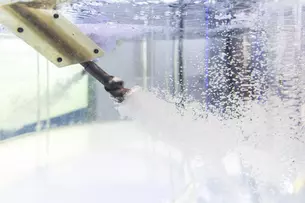Municipalities on the way to climate-friendly water management
“One of the major challenges facing water management in Germany—and not just there—is the changing climate,” Prof. Dr. Uli Paetzel is certain. The President of the German Association for Water, Wastewater and Waste (DWA) continues: “In the future, urban planners and water economists will have to join forces even more to better compensate extreme weather conditions such as heat and heavy rain.”

Many cities and municipalities are already breaking new ground in rainwater management. For example, in a new urban quarter in Münster, Germany, rainwater will not simply be fed into the canal, but will be drained off superficially and stored in troughs. The evaporation from there improves the microclimate and contributes to lowering the ambient temperature in summer heat. The retention of rainwater on the surface and the increase in seepage and evaporation also reduce the risk of flooding in the event of heavy rainfall. The North Rhine-Westphalian Ministry of the Environment is funding the flagship project with 1.6 million euros.
Berlin with first rainwater agency
There are also efforts in Berlin to make the federal capital and its environs even more “water sensitive and climate proof”. So, in May last year, the state of Berlin and Berliner Wasserbetriebe founded Germany's first rainwater agency. Being part of the Wasserbetriebe, it is intended to support the Berlin administration, planners and citizens in the implementation of decentralized solutions for new rainwater management. The propagated measures include the promotion of green roofs and the avoidance of additional sealed surfaces.
Major storage sewer project in Berlin’s Mauerpark
In addition, there has been a storage program in Berlin since the 1990s: in the event of heavy or prolonged rainfall, the water masses from the inner-city combined sewer system are stored underground in basins, storage sewers or even in large backwater canals. By 2024, these shall have a total capacity of 300,000 m³. Current flagship project in this context is the Mauerpark storage sewer. Since the end of 2017, a 654 m long canal with a capacity of 7,400 m³ has been under construction using trenchless methods in Berlin’s Prenzlauer Berg district. Completion of the 20-million-euro construction is planned for the first half of 2020. It is currently being equipped with a drainage pumping station, last access shafts and a flushing device.
Investments in sewer rehabilitation as an opportunity to redesign drainage systems
The effects of the climate problem on sewage and precipitation disposal not only expand to such new constructions, but also to the “permanent task” of sewer rehabilitation.
“The redesign of above-ground drainage routes and decentralized retention/treatment systems for rainwater as well as the strengthening of the natural water cycle must be just as much a component of holistic wastewater and sewer network management as the sewer renovation,” demands Dr. Ing. Christian Falk, Technical Operations Manager of Stadtentwässerung Dortmund.
And the billions invested annually in sewer rehabilitation represent an opportunity to redesign the networks. In Dortmund, for example, since the turn of the millennium, more than 20 bodies of water have already been decoupled from the sewer network or are in the planning stage for this purpose. “This not only strengthens the natural water cycle and sustainably improves the inner-city microclimate, but also relieves the sewer network hydraulically,” emphasizes Christian Falk and continues: “This means that sewer renovations can be carried out underground much more cheaply, quickly and with far less impact on residents and traffic.”
Drinking water supply in the stress test
As regards the drinking water supply and distribution, the hot summers of 2018 and 2019, with their high demand for water, were downright stress tests for the systems, according to the German Association of Local Utilities (VKU). “Apart from a few local exceptions, the water suppliers have mastered this test very well with special basic conditions,” says Karsten Specht, Vice President of the VKU, whose members supply drinking water to around 90 percent of all Germans. According to the association’s observations, the water suppliers are now increasingly testing how climate proof their systems are. Where necessary, they upgrade the infrastructure or seek cooperation with neighboring suppliers. “However, at local level, the effects of climate change on drinking water supply systems can vary greatly,” says Karsten Specht. That's why, in his words, solutions have to be found that fit the bill rather than be universal—not least because it is always expensive to adapt infrastructures.
Promotional program of the Federal Ministry for the Environment
The funding program “Measures for Adaptation to the Consequences of Climate Change” of the German Federal Ministry for the Environment, Nuclear Conservation and Nuclear Safety can provide financial support for municipalities, companies and social actors that want to prepare for heat waves or floods sustainably and for the long term. Up to 300,000 euros each are available for lighthouse projects on climate adaptation and for the development of regional cooperation. Project outlines can still be submitted until the end of October this year.
